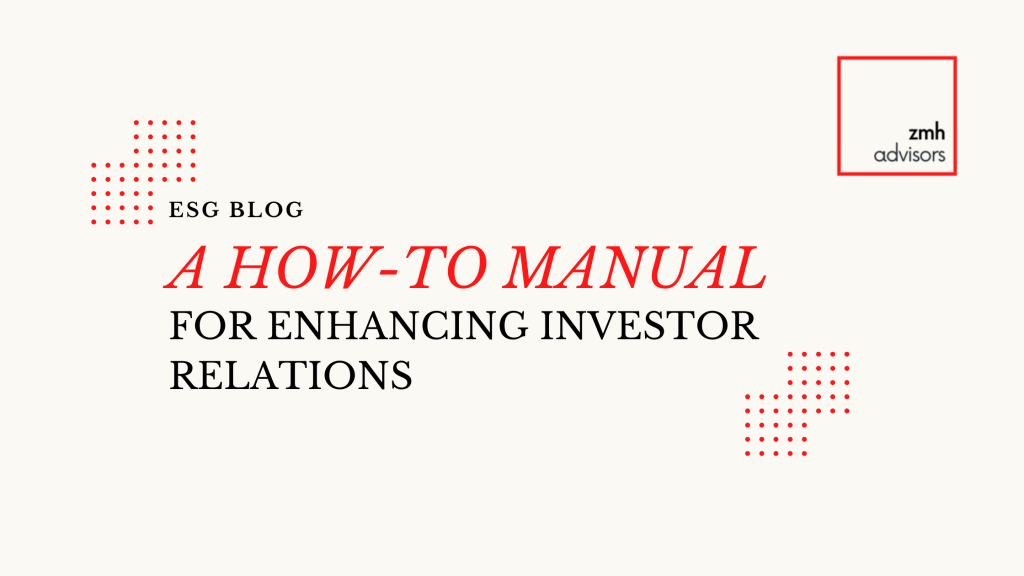Relationships are important in just about every facet of life: personal, familial, and professional. It should be no surprise that fostering good working relationships with the governance teams of institutional investors that hold a significant stake in your company is critical to long-term success in investor relations.
Why It’s Important to Have Relationships with Institutional Investors
Institutional investors can significantly impact what happens in your company. As owners, they can exercise their voting rights to influence governance and policy of the company – most notably through mergers and acquisitions, director elections, and other major ESG Initiatives. They can submit shareholder proposals and join forces with other investors to become “activists” seeking to change the business strategy and/or leadership. They can even “vote with their feet” and sell their stake, thereby depressing your stock price.
Your investors may have relationships with significant external influencers. They might lobby federal, state, and local politicians to enact or enforce laws which impact a company’s bottom line, or they might already have relationships with members of your board of directors or major customers and suppliers. Maintaining a wide-ranging perspective about how your institutional investors exert influence is beneficial to understanding the nuances of your relationships with them.
Good investor relationships can be leveraged to better understand investor perspectives and priorities. Their ideas and suggestions may improve the execution and development of your business strategies.
Good shareholder relationships can improve your reputation with other stakeholders, including potential customers and suppliers. It can boost employee morale or even help generate interest among other investors in the broader community.
Tips for Building & Maintaining Relationships with Governance Teams
For each institutional investor, companies should seek to build relationships with both the portfolio managers as well as the members of the governance/stewardship teams (sometimes referred to as the “proxy committees”).
The company’s finance and investor relations teams are often tasked with building these relationships, though it is beneficial to include individuals from different departments depending on the topic of focus and the level of detail requested. These teams could include HR for DEI discussions, Head of IT for insight on cybersecurity protections, or a sustainability officer for deep dives on Scope 1 and 2 emissions.
Here are five tips to consider when developing governance team relationships:
- Identify key contacts – It’s fundamental to know who to talk to, but not always easy to identify the key points of contact. As institutional investors do not provide public directories and typically have turnover on their governance teams, this task can feel impossible. Do your homework, connect with multiple governance team members, and keep a log to track who you met with and what was discussed to ensure you can put your best foot forward.
- Conduct research on investor proxy voting guidelines and past voting records – Familiarity with an investor’s voting guidelines and recent voting history is essential; neglecting this task will give the investor a sense that their time is being undervalued, and you will likely be unprepared in addressing their questions and concerns. This can close doors and hinder relationships.
- Tailor engagement strategies to fit investor priorities and preferences – Once you know who your key contact is and what they want (and don’t want), you can tailor your communications to address their priorities in a persuasive manner.
- Be proactive to address investor concerns and suggestions – Once you get input from investors, create action items, and execute. Take it upon yourself to be sincere; the investor might not expect the company to do everything requested, but the manner in which you deliver both good and bad news can do wonders for your relationship if you operate with tact.
- Leverage technology for engagement – The use of technology to facilitate investor engagement can instantly place valuable data at your fingertips. It can be difficult to stay on top of 50+ investor relationships, while navigating the nuances of each. Utilize the technology tools that are available to you.
The ZMH advisory team not only has requisite expertise to partner with you to get the most out of your engagement efforts, but we also have the technology tools so you can manage – and improve – your relationships with governance teams.
Check out our Investor Engagement Dashboard to see how our proprietary technology can help you transform your relationship management, cut your engagement preparation drastically, and position you as an essential team member.
To schedule a demo of our Dashboard, please contact us at info@zmhadvisors.com

Posted Date: 03-15-23
